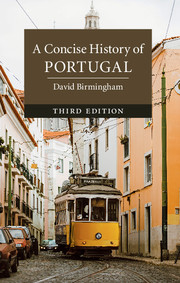Book contents
- Frontmatter
- Dedication
- Contents
- List of illustrations
- Preface to the third edition
- Map1
- Introduction
- Map2
- 1 Peoples, cultures and colonies
- 2 Rebellion and independence in the seventeenth century
- 3 The golden age and the earthquake in the eighteenth century
- 4 Brazilian independence and the Portuguese Revolution
- 5 The bourgeois monarchy and the republicans
- 6 The dictatorship and the African empire
- 7 Democracy and the European Community
- Afterword: entering the twenty-first century
- The houses of Avis, Beja and Habsburg
- The houses of Braganza and Braganza-Saxe-Coburg
- Republican presidents
- Select source materials
- Selected works published since 1990
- Further reading in English
- Index
Preface to the third edition
Published online by Cambridge University Press: 28 March 2018
- Frontmatter
- Dedication
- Contents
- List of illustrations
- Preface to the third edition
- Map1
- Introduction
- Map2
- 1 Peoples, cultures and colonies
- 2 Rebellion and independence in the seventeenth century
- 3 The golden age and the earthquake in the eighteenth century
- 4 Brazilian independence and the Portuguese Revolution
- 5 The bourgeois monarchy and the republicans
- 6 The dictatorship and the African empire
- 7 Democracy and the European Community
- Afterword: entering the twenty-first century
- The houses of Avis, Beja and Habsburg
- The houses of Braganza and Braganza-Saxe-Coburg
- Republican presidents
- Select source materials
- Selected works published since 1990
- Further reading in English
- Index
Summary
The first edition of this book was researched in the 1980s after many Portuguese academics had returned from exile following the revolution of 1974. It was based on their published works and their original research. My own contribution derived from a feeling for Portuguese culture gained while studying the history of the Portuguese empire in Africa. That work culminated in the publication of A Short History of Modern Angola in 2015. Since the earlier edition of the present history was written, post-imperial Portugal has rolled on as the country took steps to ally itself with Europe in a free trade area and eventually a currency union.
In this third, enhanced edition of the book, prepared in 2017, I have attempted to stand back and assess the changes that have affected Portuguese society as its leaders negotiated the economic hiccups of the twenty-first century. The country was harshly hit by the financial crash of 2008 and many employees in the state sector saw their standard of living deteriorate. By contrast, a few private sector branches of industry did rather well combining middle levels of technology with relatively cheap rates of pay. Agriculture, however, continued to struggle and even the booming tourist industry went through years of rollercoaster uncertainty.
Migration had been a central feature of Portuguese experience since late medieval times and continued to be a dynamic influence in the twenty-first century. High-flying Portuguese, be they football players, bureaucrats, engineers or financiers, found lucrative first-world positions in Europe and North America. Meanwhile, middle-ranking artisans grasped new employment opportunities which opened up in Africa as Angola benefited from a temporary boom in the price of crude oil and from Chinese investment in infrastructure projects. Portuguese craftsmen and managers – probably 100,000 or more – travelled south with the building trade. An important feature of the Africa dimension was a kind of ‘reverse neocolonialism’ as the ruling families of Angola invested some of their bounty in Portugal. Portuguese service and financial industries, which had been targeted by Spanish investors when Portugal first entered Europe, fell into the hands of Angolans as the government negotiated the rocky road to austere survival by privatising state-owned industries.
- Type
- Chapter
- Information
- A Concise History of Portugal , pp. xiii - xivPublisher: Cambridge University PressPrint publication year: 2018

